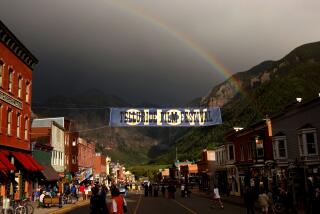GAY FILM, VIDEO FEST DUE FRIDAY
Sensibility, not sex, is the point of the ambitious and challenging third Los Angeles Gay and Lesbian Film/Video Festival, which begins Friday at the Four Star Theater.
With 20 film programs, including 15 premieres, assembled under the direction of Larry Horne, the weeklong event marks the largest festival of its kind to date. For full program information: (213) 650-7093.
In these films, at least those in the generous and widely varied portion available for preview, homosexuality is only an aspect of a larger view of life that addresses heterosexuals as well as gays and lesbians. Even in a documentary with such specific relevance for homosexuals as Greta Schiller’s award-winning “Before Stonewall: The Making of a Gay and Lesbian Community,” the experiences related by older gays and lesbians--hardy, good-humored survivors all--inevitably reveal the oppressive puritanism, hypocrisy and sexual ignorance in which generations of Americans came of age.
Ranging from the surreal to the traditional in style, the films are marked by such an emphatically personal vision that even the farthest-out experiments command respect and attention. “Before Stonewall,” which launches the festival at 8 p.m. Friday, will be followed at 10 with the West Coast premiere of Dutch writer-director Marleen Gorris’ impressive, relentless “Broken Mirrors,” in which a brothel becomes a metaphor for men’s brutal exploitation of women--and also a place in which women become attracted to each other. (Gorris’ first film was the controversial “A Question of Silence.”)
A brothel is also the key setting of Mexican film-maker Arturo Ripstein’s imaginative fable “El Lugar sin Limites” (A Place Without Limits). Spanning two generations of life in a seedy village falling increasingly in the grasp of an elderly politico, it tells of a drag queen flamenco dancer (Roberto Cobo, who is remarkable with his sinewy physique at poignant odds with his effeminate mannerisms) seduced by the local madam (Ana Martin) on a bet in order that she win ownership of her bordello--and of Cobo’s later brave act of self-sacrifice to protect their beautiful daughter (Lucha Villa).
“El Lugar sin Limites” shares the same feminist sentiments as “Broken Mirrors” as it becomes an all-out attack on machismo, suggesting that it can often mask in a man a highly insecure sense of masculinity. “El Lugar sin Limites” is a “La Cage aux Folles” played for tragedy.
Two key Sunday offerings are both experimental. Dutch film-maker Eric de Kuyper’s misleadingly titled “Naughty Boys” (screening at 4 p.m.) is a highly stylized, highly distanced observation of six young men, all formally dressed, at the bored and indolent end of a house party held at an elegant country estate sometime in the ‘30s. For whatever reason, all these men, of varying nationalities but all English-speaking, seem to have been jilted by their girlfriends (who are seen only in fantasy singing and dancing sequences). De Kuyper at once celebrates the beauty and vulnerability of his subjects--and a precisely evoked privileged way of life so soon to vanish with World War II.
Elfi Mikesch and Monika Treut’s “Seduction: the Cruel Woman” (Sunday at 7) is a very Germanic, darky humorous attempt to transform sado-masochism into a performance art, centering on a Hamburg dominatrix who caters to both men and women. “Seduction: the Cruel Woman,” which is virtually (and thankfully) entirely psychological rather than physical, unfolds as a series of boldly composed tableaux vivants. Like other forays of the New German Cinema into the extremes of camp pathos, this film is clearly not for everyone, straight or gay, yet it is compelling in its insights as well as in its originality.
More to Read
The biggest entertainment stories
Get our big stories about Hollywood, film, television, music, arts, culture and more right in your inbox as soon as they publish.
You may occasionally receive promotional content from the Los Angeles Times.










